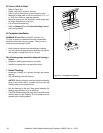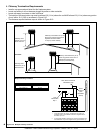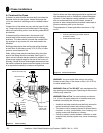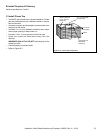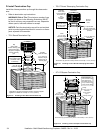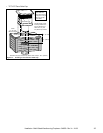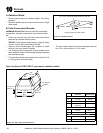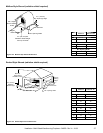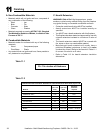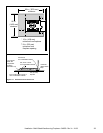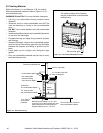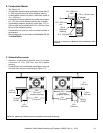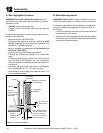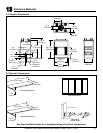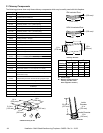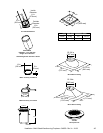
38
11
11
Finishing
A. Non-Combustible Materials
• Materials which will not ignite and burn, composed of
any combination of the following:
- Steel - Iron
- Brick - Tile
- Concrete - Slate
- Glass - Plasters
• Materials reported as passing ASTM E 136, Standard
Test Method for Behavior of Metals, in a Vertical Tube
Furnace at 750° C
B. Combustible Materials
• Materials made of or surfaced with any of the following
materials:
- Wood - Compressed paper
- Plant fi bers - Plastic
• Any material that can ignite and burn; fl ame proofed or
not, plastered or un-plastered
Table 11.2
C. Hearth Extension
WARNING! Risk of fi re! High temperatures, sparks,
embers or other burning material falling from the fi replace
may ignite fl ooring or concealed combustible surfaces.
• Protective metal hearth strips MUST be installed.
• Hearth extensions MUST be installed exactly as
specifi ed.
Table 11.1
Hearth Extension Insulation Alternatives-Total minimum R Value must equal 1.03
Material
k per inch
thick
r per inch
thick
Minimum
thickness
required
Hearth & Home HX3, HX4 (Micore 300™) 0.49 2.06 1/2 in.
USG Micore 160™ 0.39 2.54 1/2 in.
USG Durock™ Cement Board 1.92 0.52 2 in.
Cement Mortor 5.0 0.20 5-1/8 in.
Common Brick 5.0 0.20 5-1/8 in.
Ceramic Tile 12.50 0.08 12-1/4 in.
Armstrong™ Privacy Guard Plus 0.46 2.18 1/2 in.
Marble 14.3-20.0 0.07-0.05 14-5/8 in. - 20-3/8 in.
R = 1/k x inches of thickness
• You MUST use a hearth extension with this fi replace.
• This fi replace has been tested and approved for use with
a hearth extension insulated to a minimum R value of
1.03.
• The hearth extension material MUST be covered with
tile, stone or other non-combustible material.
• Manufactured hearth materials will usually have a
published R value (resistance to heat) or k value
(conductivity of heat). Refer to the formula in Table 11.1
to convert a k value to an R value,
• Refer to Table 11.2 for hearth extension insulation
alternatives.
Heatilator • Multi-Sided Woodburning Fireplace • 34955 • Rev V • 11/08



